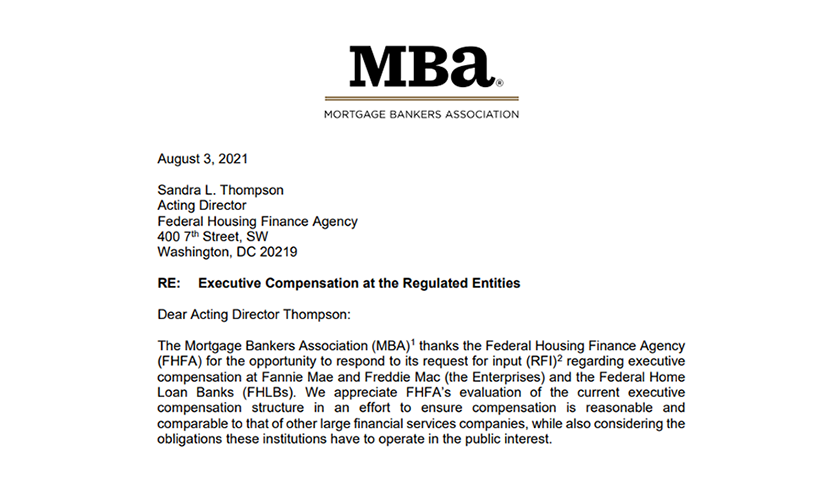
MBA: GSE Compensation Should be Sufficient to Attract Best Talent

The most important asset Fannie Mae, Freddie Mac and the Federal Home Loan Banks have is their human capital, so their compensation must be sufficient to attract and retain top talent, the Mortgage Bankers Association said in a letter to the Federal Housing Finance Agency Tuesday.
Responding to a FHFA request for input regarding executive compensation at Fannie Mae, Freddie Mac and the Federal Home Loan Banks, MBA President and CEO Robert Broeksmit, CMB, said MBA appreciates FHFA’s evaluation of the current executive compensation structure to ensure compensation at the Enterprises is “reasonable and comparable to that of other large financial services companies,” while also considering the obligations these institutions have to operate in the public interest.
“The greatest asset of these institutions is their human capital, so executive compensation must be set at a level sufficient to attract and retain top-level talent,” Broeksmit said. “It also is critical that compensation programs, and in particular incentive structures within these programs, foster competitive, liquid, efficient and resilient national housing finance markets while affirmatively promoting safety and soundness objectives.”
Broeksmit said MBA believes FHFA should take a “measured approach” to executive compensation with a goal of striking the appropriate balance between these two requirements. “That is, the level of compensation should be predicated on attracting and retaining talented executives with industry expertise, while the structure of this compensation should encourage prudent risk management and financial stewardship,” he said.
The letter noted MBA has long supported efforts to implement reforms to the Enterprises and to move them closer to a state in which they can safely exit conservatorship. “While the transition from conservatorship to full ownership by non-government shareholders will be a major shift for the Enterprises in many ways, their core functions and missions will remain unchanged, and the same high-quality staff will be necessary to carry out these duties,” MBA said. “Any compensation program established under conservatorship should be structured to function equally well for the Enterprises as shareholder-owned companies in a post-conservatorship state.”
In addition, given their significant roles in the market, it is important for the Enterprises to be innovative and responsive to market trends and needs, MBA said. “High-quality staff, once again, will enable the Enterprises to continue to develop new products, processes and systems that will benefit consumers and market participants in a continuously evolving industry. The Enterprises should have sufficient flexibility to offer competitive levels of compensation in order to attract and retain the executives needed to promote this innovation,” the letter said.
The letter noted many market participants have expressed concern with high turnover among senior executives at the Enterprises in recent months, specifically the impact these changes can have on consistent decision making and business processes. “While this turnover may or may not be related directly to compensation, the presence of competitive compensation could serve as a retention tool enabling the Enterprises to maintain talent in these critical senior roles,” MBA said.
Much like Fannie Mae and Freddie Mac, retaining high-quality staff should be of the utmost importance for the FHLBs, the letter said. The FHLBs serve a critical mission by providing stable, reliable liquidity to their member institutions, allowing them to support affordable housing and community investments. “While the FHLBs are unique in their organizational structure and mission, a similar balance between competitive compensation and safety and soundness must be achieved,” MBA said.
Broeksmit said MBA believes FHFA should regulate and oversee executive compensation at the Enterprises and the FHLBs through the “dual lenses” of ensuring high-quality human capital and encouraging safety and soundness. “The regulated entities should be permitted to offer attractive compensation packages that are competitive with similar private sector entities, while being required to structure that compensation in a manner that is aligned with the Enterprises’ public interest goals–safe and sound operations and a continued focus on affordable housing duties and missions,” he said.
